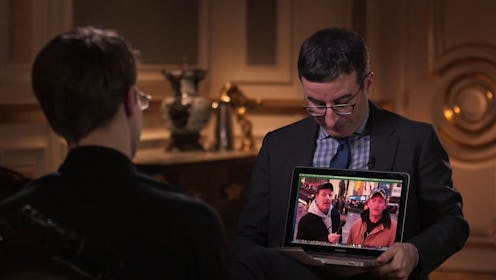News
John Oliver Asked Americans In Times Square What?

On Sunday night's episode of Last Week Tonight, host John Oliver tried to make mass surveillance a more relevant issue for Americans. During a sit-down interview with Edward Snowden in Russia, Oliver showed him a segment of Americans in Times Square who had no idea who Snowden was or what he did, as a way to illustrate how little the country cares about the government's invasive spying programs. However, if we look at broader statistics, it seems that that apathy goes much deeper: most Americans know very little about politics in general, let alone the wider implications of mass surveillance on a free society.
Reassuring that he had not "cherry-picked" the people his team interviewed in Times Square, Oliver showed random tourists and New Yorkers admitting that they had no idea who Edward Snowden was. Those who recognized his name couldn't say what he was known for, while some gave incorrect answers. One woman thought he had sold information while a few people confused him for WikiLeaks founder Julian Assange. The message here is clear: many everyday Americans are not familiar with perhaps the biggest case of whistleblowing in American history. If Oliver's segment had been on the Iran nuclear deal, or the 2016 presidential race, or even basic, fundamental elements of the American political system, it's entirely possible that the same individuals in Times Square would have been just as unsure about those topics as well.
Surveys from the last few years illustrate just how disengaged Americans are to modern politics. Last September, the Annenberg Public Policy Center (APPC) found that only 36 percent of Americans can name the three branches of the U.S. government, while 35 percent couldn't name a single one. The study also found that more than 50 percent of Americans did not know which party controlled the House and Senate. Kathleen Hall Jamieson, director of the APPC, said in a statement:
Although surveys reflect disapproval of the way Congress, the President and the Supreme Court are conducting their affairs, the Annenberg survey demonstrates that many know surprisingly little about these branches of government. This survey offers dramatic evidence of the need for more and better civics education.
Perhaps one reason why so few Americans know which party controls what in Congress is because so few citizens are voting in midterm elections these days. Analyses of last November's midterm elections show that it had the lowest turnout in 72 years, with a paltry 36.4 percent of eligible voters showing up to the polls. And even those who are voting might need a refresher course. A Pew Research poll from last July showed that only half of registered voters know the party of their congressional representative, while 22 percent incorrectly identified their representative's party and 26 percent didn't answer.
While presidential elections bring out many more constituents, a large portion of the country does not participate in electing our commander-in-chief either. In 2012, more than 40 percent of the eligible population did not bother voting for president.
If Americans don't care who leads our country, then it's only natural they won't know the names of some of our most important political leaders. A 2010 FindLaw.com survey found that two-thirds of Americans can't name a single Supreme Court justice, while a Pew Research survey from the same year saw that 40 percent of Americans couldn't name the current vice president in an open-ended (non-multiple choice) question. Nearly half the country couldn't answer Joe Biden more than a year into his term as VP.
So if Americans aren't plugged into politics, then what are they plugged into? A 2011 APPC survey found that while only 15 percent of Americans could name the chief justice of the Supreme Court, John Roberts, 27 percent could name Randy Jackson as a judge on American Idol.Images:
Last Week Tonight With John Oliver/YouTube, Getty Images (2)